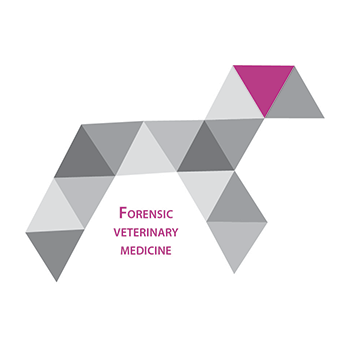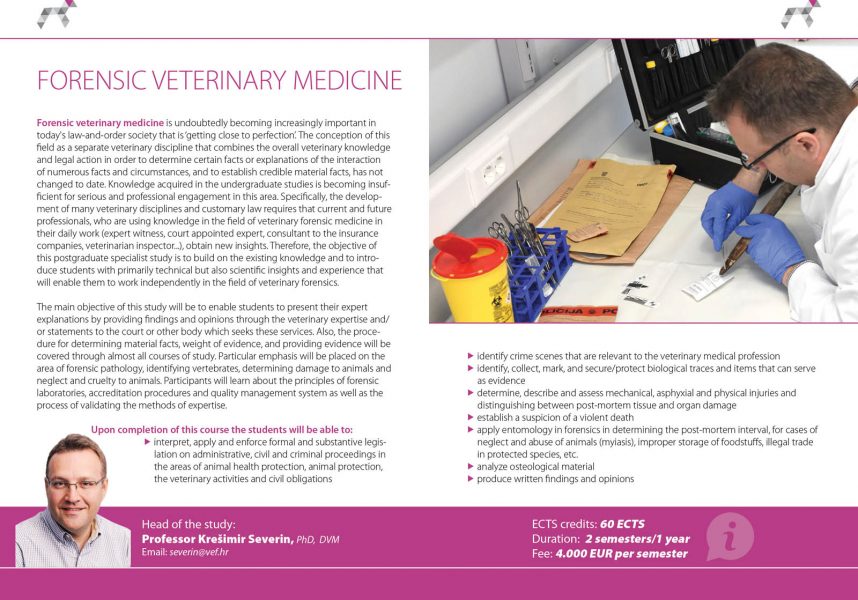Forensic veterinary medicine is undoubtedly becoming increasingly important in today’s law-and-order society that is ‘getting close to perfection’. The conception of this field as a separate veterinary discipline that combines the overall veterinary knowledge and legal action in order to determine certain facts or explanations of the interaction of numerous facts and circumstances, and to establish credible material facts, has not changed to date. Knowledge acquired in the undergraduate studies is becoming insufficient for serious and professional engagement in this area. Specifically, the development of many veterinary disciplines and customary law requires that current and future professionals, who are using knowledge in the field of veterinary forensic medicine in their daily work (expert witness, court appointed expert, consultant to the insurance companies, veterinarian inspector…), obtain new insights.
Therefore, the objective of this postgraduate specialist study is to build on the existing knowledge and to introduce students with primarily technical but also scientific insights and experience that will enable them to work independently in the field of veterinary forensics. The main objective of this study will be to enable students to present their expert explanations by providing findings and opinions through the veterinary expertise and/or statements to the court or other body which seeks these services. Also, the procedure for determining material facts, weight of evidence, and providing evidence will be covered through almost all courses of study. Particular emphasis will be placed on the area of forensic pathology, identifying vertebrates, determining damage to animals and neglect and cruelty to animals. Participants will learn about the principles of forensic laboratories, accreditation procedures and quality management system as well as the process of validating the methods of expertise.
Upon completion of this course the students will be able to:
- interpret, apply and enforce formal and substantive legislation on administrative, civil and criminal proceedings in the areas of animal health protection, animal protection, the veterinary activities and civil obligations
- identify crime scenes that are relevant to the veterinary medical profession
- identify, collect, mark, and secure/protect biological traces and items that can serve as evidence
- determine, describe and assess mechanical, asphyxial and physical injuries and distinguishing between post-mortem tissue and organ damage
- establish a suspicion of a violent death
- apply entomology in forensics in determining the post-mortem interval, for cases of neglect and abuse of animals (myiasis), improper storage of foodstuffs, illegal trade in protected species, etc.
- analyze osteological material
- produce written findings and opinions
ECTS credits: 60
Duration: 2 semesters/1 year
Price per semester: 5000,00 €
Head of the course: Professor Krešimir Severin, PhD, DVM
e-mail: severin@vef.hr

prof. dr. sc. Krešimir Severin

- E: severin@vef.hr
- T: 01/2390-125
prof. dr. sc. Andrea Gudan Kurilj

- E: agudan@vef.hr
- T: 01/2390-311
prof. dr. sc. Gordana Gregurić Gračner

- E: ggracner@vef.unizg.hr
- T: 01/2390-293
prof. dr. sc. Tomislav Mašek

- E: tomislav.masek.@vef.unizg.hr
- T: 01/2390-270
prof. dr. sc. Nevijo Zdolec

- E: nzdolec@vef.hr
- T: 01/2390-193
prof. dr. sc. Dean Konjević

- E: dean.konjevic@vef.hr
- T: 01/2390-131
izv. prof. dr. sc. Kristina Starčević

- E: kristina.starcevic@vef.hr
- T: 01/2390-300
Obligatory Courses |
| Legal regulations and introduction to forensic expert analyses in the field of veterinary medicine |
| Crime scene investigation |
| Forensic veterinary pathology |
| Basics of forensic entomology |
| Basics of forensic botany, palynology and diatomology |
| Identification of vertebrates |
| Animal feeding in forensic veterinary medicine |
| Food of animal origin in forensic veterinary medicine |
Elective Courses
| Forensic osteology and zooarchaeology |
| Animal abuse and neglect |
| Predation and damage on animals |
| Comparative odontology in forensic veterinary medicine |
| Firearms and ballistics in forensic veterinary medicine |
| Forensic laboratories and analytical methods |

 Faculty of
Faculty of 